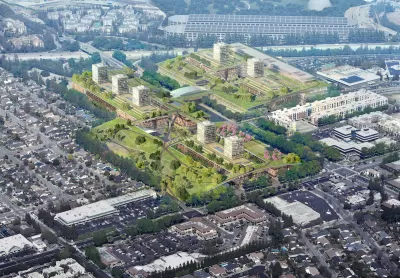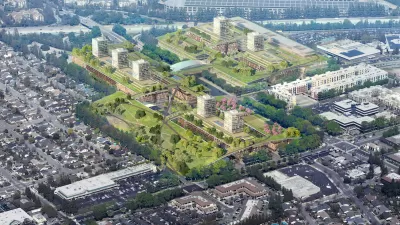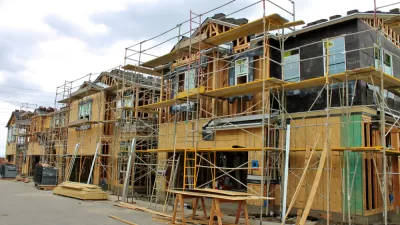A new state law meant to overcome local barriers to development is having its first big test run in Cupertino, California.

"In a critical test of a controversial state law intended to fight California’s crippling housing shortage, [the city of Cupertino] is just days from being forced to approve a massive residential, office and retail development that some residents fear will destroy their quality of life," according to an article by Marisa Kendall.
The word "forced" in that passage raises a question about local control, and state legislation by the name of SB 35 is the answer in the form of state preemption. "[U]nder SB 35, the developer that bought the rundown Vallco Mall holds most of the cards — and appears likely to build more than 2,000 badly needed homes on the site, whether the community likes it or not."
As described in a Planetizen post from earlier this year, SB 35, authored by State Senator Scott Weiner and approved in 2017, streamlines approvals for projects including affordable housing and meeting other requirements like union labor for construction.
Sand Hill Property Company plans to add some 2,402 residential units, 400,000 square feet of retail space, and 1.81 million square feet of office to the Vallco Mall property.
The political drama is still playing out in Cupertino, reports Kendall. "Developers, academics and advocates throughout the Bay Area and beyond are rapt as they watch the confrontation that has turned Cupertino into a microcosm of the forces at play in the housing crisis — and a potential precursor for development battles across the state." An organization called Better Cupertino is fighting the project, and could sue when/if the plan is approved by the city.
FULL STORY: Battle heats up over trailblazing Silicon Valley housing development

Planetizen Federal Action Tracker
A weekly monitor of how Trump’s orders and actions are impacting planners and planning in America.

Maui's Vacation Rental Debate Turns Ugly
Verbal attacks, misinformation campaigns and fistfights plague a high-stakes debate to convert thousands of vacation rentals into long-term housing.

Restaurant Patios Were a Pandemic Win — Why Were They so Hard to Keep?
Social distancing requirements and changes in travel patterns prompted cities to pilot new uses for street and sidewalk space. Then it got complicated.

In California Battle of Housing vs. Environment, Housing Just Won
A new state law significantly limits the power of CEQA, an environmental review law that served as a powerful tool for blocking new development.

Boulder Eliminates Parking Minimums Citywide
Officials estimate the cost of building a single underground parking space at up to $100,000.

Orange County, Florida Adopts Largest US “Sprawl Repair” Code
The ‘Orange Code’ seeks to rectify decades of sprawl-inducing, car-oriented development.
Urban Design for Planners 1: Software Tools
This six-course series explores essential urban design concepts using open source software and equips planners with the tools they need to participate fully in the urban design process.
Planning for Universal Design
Learn the tools for implementing Universal Design in planning regulations.
Heyer Gruel & Associates PA
JM Goldson LLC
Custer County Colorado
City of Camden Redevelopment Agency
City of Astoria
Transportation Research & Education Center (TREC) at Portland State University
Jefferson Parish Government
Camden Redevelopment Agency
City of Claremont





























